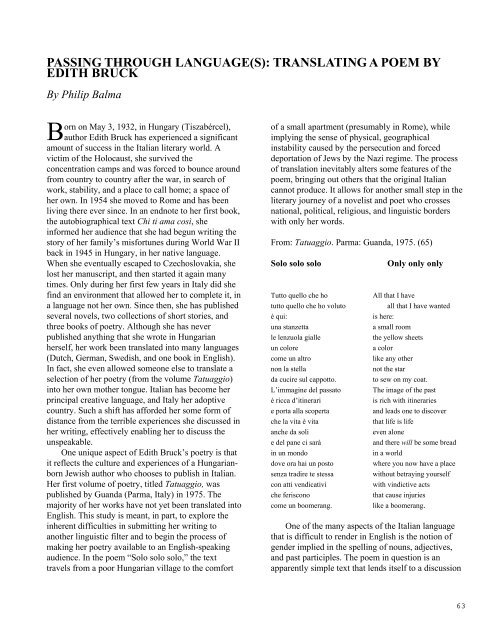their - The University of Texas at Dallas
their - The University of Texas at Dallas
their - The University of Texas at Dallas
Create successful ePaper yourself
Turn your PDF publications into a flip-book with our unique Google optimized e-Paper software.
PASSING THROUGH LANGUAGE(S): TRANSLATING A POEM BY<br />
EDITH BRUCK<br />
By Philip Balma<br />
B<br />
orn on May 3, 1932, in Hungary (Tiszabércel),<br />
author Edith Bruck has experienced a significant<br />
amount <strong>of</strong> success in the Italian literary world. A<br />
victim <strong>of</strong> the Holocaust, she survived the<br />
concentr<strong>at</strong>ion camps and was forced to bounce around<br />
from country to country after the war, in search <strong>of</strong><br />
work, stability, and a place to call home; a space <strong>of</strong><br />
her own. In 1954 she moved to Rome and has been<br />
living there ever since. In an endnote to her first book,<br />
the autobiographical text Chi ti ama così, she<br />
informed her audience th<strong>at</strong> she had begun writing the<br />
story <strong>of</strong> her family’s misfortunes during World War II<br />
back in 1945 in Hungary, in her n<strong>at</strong>ive language.<br />
When she eventually escaped to Czechoslovakia, she<br />
lost her manuscript, and then started it again many<br />
times. Only during her first few years in Italy did she<br />
find an environment th<strong>at</strong> allowed her to complete it, in<br />
a language not her own. Since then, she has published<br />
several novels, two collections <strong>of</strong> short stories, and<br />
three books <strong>of</strong> poetry. Although she has never<br />
published anything th<strong>at</strong> she wrote in Hungarian<br />
herself, her work been transl<strong>at</strong>ed into many languages<br />
(Dutch, German, Swedish, and one book in English).<br />
In fact, she even allowed someone else to transl<strong>at</strong>e a<br />
selection <strong>of</strong> her poetry (from the volume T<strong>at</strong>uaggio)<br />
into her own mother tongue. Italian has become her<br />
principal cre<strong>at</strong>ive language, and Italy her adoptive<br />
country. Such a shift has afforded her some form <strong>of</strong><br />
distance from the terrible experiences she discussed in<br />
her writing, effectively enabling her to discuss the<br />
unspeakable.<br />
One unique aspect <strong>of</strong> Edith Bruck’s poetry is th<strong>at</strong><br />
it reflects the culture and experiences <strong>of</strong> a Hungarianborn<br />
Jewish author who chooses to publish in Italian.<br />
Her first volume <strong>of</strong> poetry, titled T<strong>at</strong>uaggio, was<br />
published by Guanda (Parma, Italy) in 1975. <strong>The</strong><br />
majority <strong>of</strong> her works have not yet been transl<strong>at</strong>ed into<br />
English. This study is meant, in part, to explore the<br />
inherent difficulties in submitting her writing to<br />
another linguistic filter and to begin the process <strong>of</strong><br />
making her poetry available to an English-speaking<br />
audience. In the poem “Solo solo solo,” the text<br />
travels from a poor Hungarian village to the comfort<br />
<strong>of</strong> a small apartment (presumably in Rome), while<br />
implying the sense <strong>of</strong> physical, geographical<br />
instability caused by the persecution and forced<br />
deport<strong>at</strong>ion <strong>of</strong> Jews by the Nazi regime. <strong>The</strong> process<br />
<strong>of</strong> transl<strong>at</strong>ion inevitably alters some fe<strong>at</strong>ures <strong>of</strong> the<br />
poem, bringing out others th<strong>at</strong> the original Italian<br />
cannot produce. It allows for another small step in the<br />
literary journey <strong>of</strong> a novelist and poet who crosses<br />
n<strong>at</strong>ional, political, religious, and linguistic borders<br />
with only her words.<br />
From: T<strong>at</strong>uaggio. Parma: Guanda, 1975. (65)<br />
Solo solo solo<br />
Tutto quello che ho<br />
tutto quello che ho voluto<br />
è qui:<br />
una stanzetta<br />
le lenzuola gialle<br />
un colore<br />
come un altro<br />
non la stella<br />
da cucire sul cappotto.<br />
L’immagine del pass<strong>at</strong>o<br />
è ricca d’itinerari<br />
e porta alla scoperta<br />
che la vita è vita<br />
anche da soli<br />
e del pane ci sarà<br />
in un mondo<br />
dove ora hai un posto<br />
senza tradire te stessa<br />
con <strong>at</strong>ti vendic<strong>at</strong>ivi<br />
che feriscono<br />
come un boomerang.<br />
Only only only<br />
All th<strong>at</strong> I have<br />
all th<strong>at</strong> I have wanted<br />
is here:<br />
a small room<br />
the yellow sheets<br />
a color<br />
like any other<br />
not the star<br />
to sew on my co<strong>at</strong>.<br />
<strong>The</strong> image <strong>of</strong> the past<br />
is rich with itineraries<br />
and leads one to discover<br />
th<strong>at</strong> life is life<br />
even alone<br />
and there will be some bread<br />
in a world<br />
where you now have a place<br />
without betraying yourself<br />
with vindictive acts<br />
th<strong>at</strong> cause injuries<br />
like a boomerang.<br />
One <strong>of</strong> the many aspects <strong>of</strong> the Italian language<br />
th<strong>at</strong> is difficult to render in English is the notion <strong>of</strong><br />
gender implied in the spelling <strong>of</strong> nouns, adjectives,<br />
and past participles. <strong>The</strong> poem in question is an<br />
apparently simple text th<strong>at</strong> lends itself to a discussion<br />
63

















